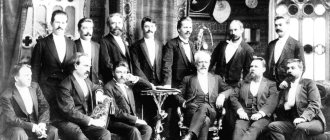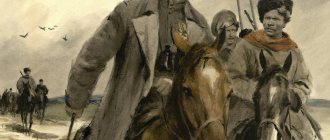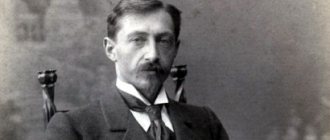Introduction
Goncharov’s work “Oblomov” was written in 1858, during the era of social reforms and intense changes in Russian society. Particularly acute during this period were the issues of preserving or completely eradicating the petty-bourgeois foundations traditional for most of the Russian nobility and landowners. One of the representatives of this social class in the work is Ilya Ilyich Oblomov - a lazy, apathetic and dreamy hero who is afraid to step over his aspirations for “Oblomovism” and illusions for the sake of a fulfilling future. It is “Oblomovism” that becomes the cause of the hero’s monotonous, half-asleep life. Goncharov reflected the tragedy of this phenomenon, first of all, in the first part of the novel, which describes one day in the life of Oblomov.
The meaning of the part
It was not for nothing that Goncharov placed a passage about a dream in the first part of the novel. It reveals why Ilya became so lethargic, lacking initiative and apathetic. The answer is simple: the parents’ excessive love for their son led to this.
Father and mother should be an example for children. It is adults who are the center of the child’s world, from whom he takes a model of behavior. His parents did not wish harm to Ilya, they only taught him to be careful and not to try to go beyond the fence. They did not instill in him a love of work and diligence, but they developed laziness and lethargy.
The main meaning of the episode, as well as the entire novel , is that a person’s life will easily lose all meaning. Such a person will be a burden; she neglects not only herself, but also her home.
Even Olga could not save Ilya, since he preferred the usual sofa and the absence of changes. The novel ends rather sadly: the main character died of heart problems. Marriage to Pshenitsyna only aggravated what was happening. He got stuck in everyday affairs - kulebyaki, pies and other little things. He has lost the habit of thinking, he no longer has the desire to act.
A brief summary of Oblomov’s dream allows you to remember the main points of the episode. A large role is given to the landscapes of Ilya’s native village. The calm and peaceful environment attracts with its serenity. Nature is harmonious and soft - this created the illusion of a measured life. Sometimes there were only funerals, weddings, birthdays.
Goncharov’s work does not lose relevance in the modern world, so many will find useful things in it. Ilya's dream reminds us that we cannot constantly live in past memories. It is necessary to learn valuable lessons from events and make them a starting point for self-development.
Source
In chapter 9 of the work, in the form of a dream of the main character, the author describes the reasons that led to his degradation.
In a dream, Oblomov sees a village that previously belonged to his parents, and now to himself, in which he spent his childhood. Life in Oblomovka flows slowly and measuredly, relations between people are distinctly patriarchal. Little Ilya Oblomov from the very beginning sees the hypertrophied care of his parents and the servants assigned to him.
The parents of the main character of the novel are depicted as kind people. They do not oppress their serfs, but simply live at their expense. However, the absence of problems and challenges from the environment made them lazy people, spending their lives as if half asleep. Here the writer, perhaps in a somewhat exaggerated form, talks about the environment in which he himself grew up. However, Goncharov, unlike his hero, was able to escape from that swamp, so he imagined it well and was able to describe the dangers that it poses.
Ilya Oblomov is depicted as an inquisitive, lively and active child, but all his natural attempts to understand the world around him, which should have formed his personality, are nipped in the bud by his parents and the serf teachers assigned to them.
The writer shows that no violence was shown to his hero, and the pressure on him was flavored with a huge amount of care and love shown. The main danger is seen precisely in this: severe punishments could either break Ilya, turning him into a weak-willed doll, or, on the contrary, develop in him a strong character, the ability to withstand pressure. However, it is not customary to respond with evil to kindness and care, which formed the lack of will of the main character.
The routine of life in the village itself played a significant role in shaping Oblomov’s character. If everything had been limited to simply prohibitions on going far from the estate or playing certain games, then perhaps Ilya would have found another field for developing his curiosity. However, life in Oblomovka was filled with a large number of rituals, including the slow absorption of food and a mandatory afternoon nap. The main character did not have much free time left.
Morning of Oblomov
At the beginning of the work, the author depicts Oblomov’s ordinary day to the reader - having woken up, Ilya Ilyich only thinks that it’s time to get out of bed, but is in no hurry to deal with urgent matters. Lying on his wide sofa in his favorite robe in the room that served him as a bedroom, a living room, a dining room, and an office, Ilya Ilyich is bored, he is overcome by frustration and melancholy. After drinking tea, he already lowered his foot to his shoes to stand up, but he changed his mind in time and decided to call Zakhar for help.
In the morning dispute between the servant and the master about the untidy room and the upcoming move, the characters’ personalities are revealed - they are both “Oblomovs”. Zakhar, as a servant, still does something, but he does it reluctantly - through force and only by order, while Oblomov is too lazy to even decide something himself. Ilya Ilyich is trying in every possible way to shift matters to the servant (and then to his friends), just so that he himself can continue to lie on the sofa and just think about how and what he could do.
Visitors to Oblomov
The monotonous day of Ilya Oblomov does not change its measured flow even with the arrival of numerous visitors. The first three guests - Volkov, Sudbinsky and Penkin - are simply acquaintances of Oblomov. They come to talk about their successes and invite Ilya Ilyich to go for a walk with them or to visit somewhere. The reader meets these characters only in the first chapter; they appear as episodic images, which Oblomov himself perceives as passing by and insignificant - he is even lazy to get up in bed to meet those who come, and remains in one place. Volkov, Sudbinsky and Penkin can rightfully be called representatives of a new generation of people - active, purposeful, sociable. They are somewhat similar to Stolz and in their own way they are trying to get Ilya Ilyich out of the “Oblomovism”, but the hero is not interested in them, so he communicates with them rather out of politeness, so that they leave quickly.
Alekseev and Tarantiev are completely different characters. They are interesting to Oblomov because they entertain him - Alekseev as a quiet, inconspicuous listener, and Tarantiev as an active principle, which, however, does not prevent Oblomov from remaining in his dreamy, apathetic state. It is Alekseev and Tarantiev’s loyal attitude to “Oblomovism” that makes them “pleasant” people to Ilya Ilyich (even despite the fact that the characters profit from Oblomov in every possible way).
However, even for their sake, Oblomov does not get out of bed, still covering himself with a blanket and explaining this by saying that the visitors came from the cold. Ilya Ilyich seems to be trying in every way to isolate himself from the surrounding, more active world, where people go to visit and go for walks. His bed and old robe become a kind of “shelter”, leaving which he can lose his half-asleep state, all-encompassing laziness and lack of will.
The only person who finally made him get out of bed at five o'clock was Stolz, who had just arrived to visit Oblomov. Not only Zakhar, who quickly fulfilled everything that was required of him, was subject to the active will of Andrei Ivanovich, but also Oblomov himself, who reluctantly obeyed the will of Stolz. It is noteworthy that if a childhood friend had not come to Ilya Ilyich, Oblomov would not have gotten out of bed the entire day, brushing off visitors whom he perceived as something secondary and unimportant in his life.
Essay: One day in the life of Oblomov in the novel “Oblomov” (I.A. Goncharov)
(681 words) Ivan Goncharov created the work “Oblomov” during a period of intense changes in Russian society and social reforms. In this era, the issues of preserving or completely eradicating the culture of the Russian nobility were of particular importance. In his novel, Ivan Aleksandrovich reflected mainly a vice of social significance - Oblomovism, reflecting the mentality of the landowner. The main character is Ilya Ilyich Oblomov, in his image the author embodied a lazy and apathetic person. He does not strive for any changes; Oblomov has no goal. He plunges into a monotonous and half-asleep life. The whole tragedy of this phenomenon is especially noticeable in the first part, where the author described one day in the life of his hero.
As soon as Oblomov wakes up in the morning, he realizes that it is time to get out of bed. But he is in no hurry to do important things. Or at least some. Oblomov is lying on the sofa in his favorite robe and is bored. He is overcome by melancholy and frustration. For Ilya Ilyich the room represented a living room, a bedroom, an office and a dining room, because he had no reason to leave it. After morning tea, Oblomov was still able to lower his feet to his shoes, but immediately called Zakhara for help.
The reader observes the dispute that arose between the master and the servant. The characters discussed the issue of the upcoming move, as well as the problem of an untidy room. It is this dispute that reflects the characters' personalities. They are both lazy and indifferent to everything, so they are ready to live in the dirt. Zakhar, although he does things, does them on Oblomov’s orders and through force. At the same time, the master does not solve any issues on his own, because it is too difficult for him. You can see how Oblomov strives to shift his own affairs onto the shoulders of Zakhar, as well as onto the shoulders of his acquaintances.
Numerous visitors come to the hero, but this does not change Oblomov’s monotonous existence. In the images of Volkov, Penkin and Sudbinsky, the author showed ordinary acquaintances of Ilya Ilyich. These heroes visit Oblomov to simply tell about their own successes and invite a friend to go with them either for a visit or for a walk. The reader notices these three characters only in the first chapter of the work. Even for Oblomov they are insignificant people. After all, the hero is even too lazy to get out of bed to meet these guests. Beijing, Sudbinsky and Volkov are active, sociable and purposeful people. These heroes are somewhat reminiscent of Stolz. They are trying in every possible way to make sure that the hero gets out of the state of Oblomovism. But the characters are not of particular interest to Oblomov. Most likely, Ilya Ilyich enters into conversation with them only out of politeness, so that they leave his house as quickly as possible.
Alekseev and Tarantiev are received more warmly, because they are entertaining the master. Alekseev appears in the image of an inconspicuous and quiet listener. Tarantiev talks a lot, but does not prevent the hero from remaining in his dreamy, apathetic state. They are loyal to the phenomenon of Oblomovism and do not bother Ilya Ilyich. But even for their sake, Oblomov is not going to get out of bed. He covers himself with a blanket, explaining that the guests came “from the cold.” The reader notices that Oblomov is trying in every possible way to protect himself from the active world. The sofa and robe for the hero are a kind of refuge from a rapidly changing society. Andrei Stolz alone made the character get out of bed at five o'clock in the morning. Ilya Ilyich, although reluctantly, still succumbed to Andrei’s will. Of course, if the hero’s childhood friend had not come to see him, he would not have gotten out of bed all day.
You can see that the character perceived real life through the prism of a dream. Oblomov was immersed in a dream of his native village of Oblomovka. Therefore, it is not at all surprising that the dream about Oblomovka becomes the most memorable moment in the entire day of the hero’s life. When a character mentally returns to his native land, he feels full of strength and energy. At the same time, Oblomov does not realize that this is an illusory world that has nothing to do with reality. Native Oblomovka is a wonderful fairy tale for Ilya Ilyich. Oblomov remains in this dream until Andrei Stolts forces him to get out of bed and change clothes.
It can be argued that Ivan Goncharov showed the reader one day in the life of Oblomov in order to reveal the tragedy of not only social, but also spiritual Oblomovism. This state is characterized by the fact that a person tries in every possible way to hide from reality, staying in his fictional world and not showing himself in any way in the real world. Oblomov does not strive to escape from this; the hero still dreams of Oblomovka’s idyll, without developing in any way and without achieving it through his own efforts. Depicting the sad fate of Ilya Ilyich, the writer reminds the reader of the need for constant improvement.
Author: Victoria Komarova
Oblomov's dream
Society and real life are perceived by Oblomov as if through the prism of a dream, as if true reality took place on a completely different plane - in dreams and dreams about the hero’s native estate - Oblomovka. It is not surprising that the brightest moment in the entire day of the hero’s life is the dream about Oblomovka, about the hero’s childhood and family. Ilya Ilyich feels happy, full of strength and energy when he returns there, but does not understand that these are just illusions that are in no way connected with reality. Oblomovka is for the hero the same beautiful and unattainable fairy tale as the myths and legends that his nanny told him in childhood.
For Ilya Ilyich, his bed and robe, which in the work acquire a special symbolic, “fairy-tale” function as an object of “Oblomovism,” become the focus of that unreal world of sleep and dreams that the hero does not want to part with. And while Stolz does not literally force Oblomov to change clothes and get out of bed, Ilya Ilyich clings to his illusory world in every possible way - even the hero’s apartment, furnished, at first glance, tastefully, in its untidiness, resembles Oblomovka with old, dilapidated things and time standing still. Ilya Ilyich’s argument with Zakhar that the room needs to be cleaned is intended simply to maintain the conversation - after all, any activity, any change of order and the need for action could destroy the “Oblomovism” of the hero’s soul, his illusory world - and Zakhar understands this.
Analysis 2
This chapter represents Oblomov’s memories of childhood and youth. It shows his family, estate, lifestyle, which influenced the formation of Ilya.
In my opinion, this chapter could easily be in the form of just a memoir. So, the hero’s childhood was like this. And here Ilya Ilyich sleeps and sees... I think this was done because he sleeps almost all the time! And also because a dream is almost a dream, a return to childhood could be Ilya’s dream.
How could Oblomov not become the same as everyone knows him (in a bad sense), if he became the embodiment of all the laziness and narrow-mindedness of those places. And it turns out that both the baby and the teenager Ilyusha loved to play mischief... Run into the forest alone, play snowballs with the guys. But the mothers looked after him so much that they became hysterical from the behavior of this “imp.” And they still didn’t allow him to do anything, he couldn’t even put on stockings himself or lift any thing, that is, the servants! And they encouraged his dislike of studying, that is, they helped him shirk his studies. They also instilled in him a fear of the world with fairy tales and a love for “magical freebies.”
In general, the relatives themselves did not do anything special, and they did not give it to others. The master was getting ready to do everything: read, write to a friend, repair the gallery and porch... More precisely, order it to be repaired. But everyone observed the rituals exactly (especially regarding food), but they were not very interested in the people themselves. Sleepy kingdom! And they were very afraid of the new. If you brought a letter, don’t take it! A stranger has fallen into a ditch and can’t get out, so don’t help! You never know...
And the nature itself in Oblomovka is suitable. Without mountains and seas that could excite, but also without unnecessary beauty that could inspire a poet. For example, the author compares the moon with a stupid village girl who naively and directly looks at the artist. I don’t even want to draw her, but only send her... for kvass. By the way, the villagers were too lazy to even get the flies out of the kvass, they simply blew them away.
There were almost no conversations in this house, since people had no thoughts, and they were afraid of new things. So they sat in silence, or even went to bed at sunset, because they were saving on candles (and they were saving on everything). They hid the money in chests, it was safer.
The only way out was for Ilya the Stolz boarding house, friendship with the German’s energetic son, Andrei. But even here everything is somehow wrong, young Stolz did translations for his friend, helped him continue to be lazy.
In general, Ilya Ilyich did not become a revolutionary - he did not change life in Oblomovka, but got stuck in it, succumbed. Everything, of course, is brought to the highest degree.





